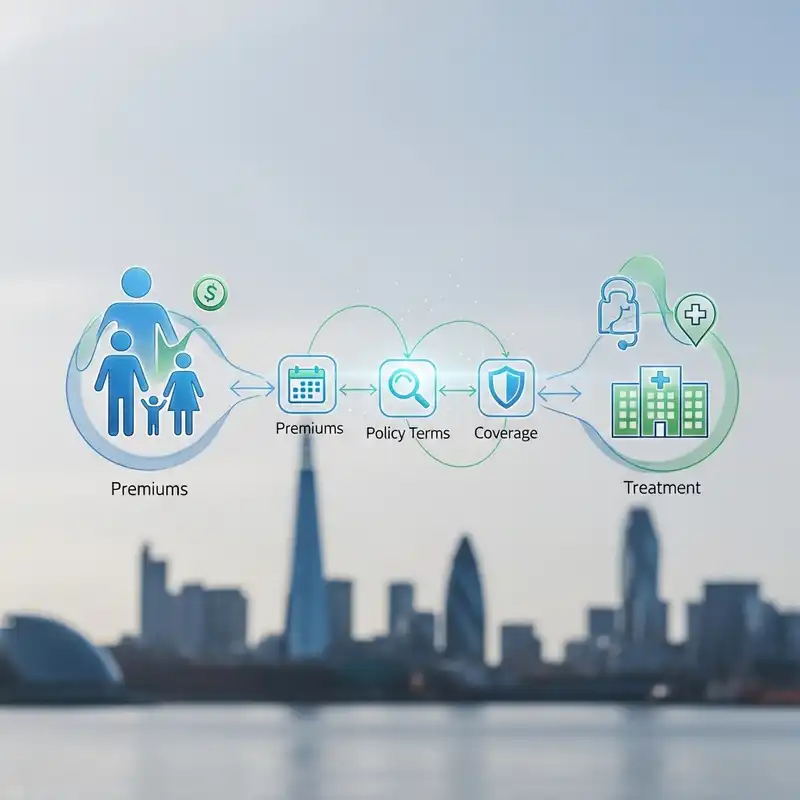Cataract Surgery with Private Health Insurance

As an FCA-authorised expert broker that has helped arrange over 900,000 policies, WeCovr provides this definitive guide to private medical insurance for cataract surgery in the UK. We explain your options, how cover works, and how to get the fast, high-quality treatment you deserve.
WeCovr explains options for cataract surgery and how cover works
Cataracts are a common and natural part of ageing, but they don't have to mean a permanent decline in your vision. While the NHS provides excellent care, waiting times can be long. This is where private health insurance comes in, offering a fast track to clear vision and a choice of advanced treatment options.
In this comprehensive guide, we'll explore everything you need to know about using private medical insurance for cataract surgery in the UK. We’ll cover what cataracts are, the difference between NHS and private treatment, how insurance cover works, and the crucial details about pre-existing conditions.
What Are Cataracts?
A cataract is a clouding of the natural lens inside your eye. Think of the lens like the one in a camera; it focuses light onto the retina at the back of the eye to create a sharp image. When this lens becomes cloudy, light can't pass through as easily, and your vision becomes blurry, misty, or dim.
Cataracts usually develop slowly over many years and are a very common condition, particularly in older adults.
Key Facts About Cataracts in the UK:
- According to the Royal National Institute of Blind People (RNIB), cataracts are the leading cause of sight impairment in the UK.
- It's estimated that around 2.5 million people aged 65 and over in England and Wales have some degree of visual impairment due to cataracts.
- Cataract surgery is the most common operation performed in the UK, with the NHS carrying out over 450,000 procedures each year.
Common Symptoms of Cataracts:
- Cloudy or blurry vision
- Colours appearing faded or washed out
- Seeing halos around lights, especially at night
- Increased difficulty with vision in low light
- Needing brighter light for reading
- Frequent changes to your glasses or contact lens prescription
The only effective treatment for cataracts is surgery to remove the cloudy lens and replace it with a clear, artificial one called an intraocular lens (IOL).
Cataract Treatment: NHS vs. Private Care
You have two main pathways for cataract surgery in the UK: the National Health Service (NHS) or private treatment, which can be self-funded or paid for by private health insurance.
The NHS Pathway
The NHS offers high-quality cataract surgery free at the point of use. The typical journey involves:
- Optician Visit: If you notice symptoms, your first stop is usually an optician who can detect the cataracts.
- GP Referral: Your optician will write to your GP, who will then refer you to an NHS ophthalmology (eye specialist) department.
- Consultation: You'll have an appointment with an ophthalmologist or a member of their team to confirm the diagnosis and assess your suitability for surgery.
- Waiting List: This is the most significant challenge. According to the latest NHS England data, the waiting list for ophthalmology is one of the largest, with many patients waiting several months—and sometimes over a year—from referral to treatment.
- Surgery: The surgery itself is usually a day case procedure using a standard, high-quality monofocal lens.
While the clinical care is excellent, the wait can significantly impact your quality of life, affecting your ability to drive, read, and enjoy daily activities.
The Private Pathway
Choosing private treatment offers several key advantages:
- Speed: Avoid long NHS waiting lists and have your surgery within weeks of your consultation.
- Choice of Surgeon: You can research and select a leading consultant ophthalmologist who specialises in cataract surgery.
- Choice of Hospital: You can choose a comfortable, modern private hospital at a time and location that suits you.
- Advanced Lens Options: The private sector provides access to premium intraocular lenses (IOLs) that can correct other vision issues like astigmatism or the need for reading glasses.
- Personalised Care: You benefit from longer consultation times and a more personal, tailored experience.
This is where private medical insurance becomes invaluable, covering the costs of this superior service and getting you back to living life in high definition, faster.
How Private Health Insurance Covers Cataract Surgery
Understanding how private medical insurance (PMI) covers cataract surgery is crucial. Insurers have specific rules, but the good news is that cataract surgery is one of the most commonly covered procedures on most mid-range and comprehensive policies.
The "Acute Condition" Rule: The Most Important Thing to Know
Standard private medical insurance in the UK is designed to cover acute conditions. An acute condition is a disease, illness, or injury that is likely to respond quickly to treatment and return you to your previous state of health.
Crucially, PMI does not cover chronic or pre-existing conditions.
- Chronic Condition: A condition that is ongoing, long-term, and has no known cure (e.g., diabetes, asthma).
- Pre-existing Condition: Any illness, injury, or symptom you had before your policy start date, whether you were diagnosed or not.
So, how do cataracts fit in? While the development of cataracts is a slow, gradual process (making it seem chronic), insurers classify the need for surgery as an acute event. The surgery is a one-off procedure that resolves the problem, fitting the definition of acute treatment.
This means that if you develop cataracts after you purchase your health insurance policy, the surgery will almost certainly be covered, subject to your policy's terms.
Pre-existing Cataracts: The Exclusion
If you have already been diagnosed with cataracts, or have clear symptoms and have discussed them with a doctor or optician before taking out a policy, this will be considered a pre-existing condition and will not be covered. This is the single most important rule to understand.
This is why it's wise to consider private health cover before you need it.
Types of Underwriting and How They Affect Cataract Cover
When you buy a PMI policy, the insurer assesses your medical history. This is called underwriting.
- Moratorium Underwriting: This is the most common type. You don't declare your full medical history upfront. Instead, the insurer applies a blanket exclusion for any condition you've had symptoms, treatment, or advice for in the last 5 years. Cover for that condition can be added later, but only if you remain symptom-free and treatment-free for a continuous 2-year period after your policy starts.
- Full Medical Underwriting (FMU): You complete a detailed health questionnaire. The insurer reviews your medical history and may permanently exclude specific conditions, such as cataracts, if you've had them before. FMU provides certainty from day one about what is and isn't covered.
An expert PMI broker like WeCovr can help you understand which underwriting type is best for your circumstances.
A Step-by-Step Guide to Using Your PMI for Cataract Surgery
Let's walk through a typical real-life example of the claims process:
- Patient: David, 67, has a comprehensive private medical insurance policy with WeCovr's help. He has had the policy for three years.
- Step 1: Symptoms Appear: David notices his vision is becoming blurry and driving at night is difficult. He has never had these issues before.
- Step 2: GP Visit: He visits his GP, who suspects cataracts. The GP gives him an "open referral" to see a private ophthalmologist.
- Step 3: Contact the Insurer: David calls his insurance provider to open a claim. He provides his policy number and the referral details.
- Step 4: Pre-authorisation: The insurer confirms his policy covers cataract surgery and pre-authorises a consultation and any initial diagnostic tests (like an eye scan). They provide a list of approved specialists and hospitals in his area.
- Step 5: Private Consultation: David books an appointment with a consultant of his choice from the approved list. The consultant confirms cataracts and recommends surgery.
- Step 6: Authorise the Surgery: The consultant's office sends the treatment plan and costs to the insurer. The insurer issues an authorisation number for the surgery, confirming they will cover the costs.
- Step 7: The Procedure: David has his surgery at a private hospital just three weeks after his GP visit. The insurer pays the hospital and surgeon directly.
- Step 8: Follow-up: His policy also covers a post-operative consultation to ensure his recovery is on track.
The Critical Role of Outpatient Cover
To get to the surgery stage, you first need a diagnosis. This requires a consultation with a specialist and potentially some scans. These are considered "outpatient" services.
Your policy's level of outpatient cover is therefore very important:
| Outpatient Cover Level | What It Typically Covers | Impact on Cataract Journey |
|---|---|---|
| None / Basic | Covers only treatment once you are admitted to hospital (inpatient/day-patient). | You would need to pay for the initial consultation and diagnostic scans yourself. |
| Limited Cover | Often provides a fixed financial limit (e.g., £500 or £1,000) for outpatient services. | This should be sufficient to cover the initial consultation and tests for cataracts. |
| Comprehensive | Covers all outpatient consultations, tests, and scans in full. | Provides complete peace of mind, covering the entire journey from diagnosis to recovery. |
When choosing a policy, it's vital to ensure you have adequate outpatient cover to avoid unexpected costs.
Advanced Lenses: What Does Your Insurance Cover?
One of the biggest advantages of private treatment is the choice of intraocular lenses (IOLs). The NHS typically provides monofocal lenses as standard. Private insurance will always cover the cost of a standard monofocal lens as part of the procedure, but you may have the option to upgrade.
Here’s a comparison of the main types of IOLs:
| Lens Type | What It Does | Best For | How Insurance Covers It |
|---|---|---|---|
| Monofocal (Standard) | Corrects vision for one distance only (usually long distance). | Patients who are happy to wear reading glasses for close-up tasks. | Fully covered by most policies as the standard of care. |
| Toric | Corrects astigmatism (an imperfection in the curve of the eye) as well as long or short-sightedness. | Patients with significant astigmatism who want clearer distance vision. | Often requires a patient shortfall. The insurer pays the cost of a standard lens, and the patient pays the difference for the premium Toric lens. Some top-tier policies may cover it. |
| Multifocal/Trifocal | Provides clear vision at multiple distances (near, intermediate, and far), reducing or eliminating glasses. | Patients who want the greatest freedom from glasses after surgery. | Almost always requires a patient shortfall/co-payment. The patient pays the additional cost of the lens, which can be several hundred pounds per eye. The surgery and hospital costs are still covered by the insurance. |
Always check with your insurer before agreeing to a premium lens to understand exactly what they will contribute.
Finding the Best Private Medical Insurance UK for Cataract Cover
Choosing the right policy can feel complex, but focusing on a few key areas makes it easier. Here’s how leading UK PMI providers typically approach cataract surgery:
| Provider | Typical Cataract Cover Approach | Key Considerations |
|---|---|---|
| Bupa | Generally excellent cover for cataracts on mid-to-high-tier plans. Bupa has a large network of recognised hospitals and consultants. | Check the specific outpatient limits on your chosen plan. Bupa often works with a network of "Bupa-approved" consultants. |
| AXA Health | Strong cover for cataract surgery. Their "Guided Option" can reduce premiums if you agree to use a curated list of specialists. | Ensure your policy has sufficient outpatient cover. The guided option offers value but less choice of specialist. |
| Aviva | Comprehensive cover is standard on most policies. Aviva is known for its clear policy wording and strong customer service. | The "Expert Select" option directs you to a specialist for diagnosis and can provide a cashback incentive. |
| Vitality | Covers cataracts fully on most plans and uniquely integrates wellness rewards, encouraging a healthy lifestyle to protect eye health. | Cover is often linked to engaging with their wellness programme. Check for any excess or co-payment clauses. |
This is where an independent broker like WeCovr adds immense value. We are not tied to any single insurer. Our experts compare the entire market for you, finding a policy that provides robust cataract cover at the most competitive price, saving you time and money. Our advice is completely free.
Cost of Private Cataract Surgery (Without Insurance)
To appreciate the value of PMI, it's helpful to know the cost of paying for treatment yourself. In 2025, the typical cost for private cataract surgery in the UK is:
- Per Eye (Standard Monofocal Lens): £2,500 – £3,500
- Per Eye (Premium Multifocal/Toric Lens): £3,500 – £4,500+
These costs typically include the surgeon's fee, anaesthetist's fee, hospital costs, the lens itself, and one follow-up appointment. With private medical insurance, these costs are covered (minus any excess or shortfall for premium lenses).
Lifestyle, Diet, and Protecting Your Eye Health
While cataracts are often age-related, you can take steps to promote long-term eye health and potentially slow their progression.
- Protect from UV Light: Wear sunglasses and a wide-brimmed hat outdoors. Look for sunglasses that block 100% of UVA and UVB rays.
- Eat a Healthy Diet: A diet rich in antioxidants may help. Include plenty of colourful fruits and vegetables like spinach, kale, broccoli, and berries. Vitamins C and E are particularly beneficial for eye health.
- Don't Smoke: Smoking produces free radicals that can damage the cells in your eyes and accelerate cataract formation.
- Manage Health Conditions: Keep conditions like diabetes under tight control, as high blood sugar can damage the lenses of your eyes.
- Regular Eye Tests: Have your eyes checked by an optician at least every two years. This allows for early detection of cataracts and other conditions like glaucoma.
As a WeCovr client, you also get complimentary access to CalorieHero, our AI-powered calorie and nutrition tracking app, making it easier to manage a healthy diet for your overall wellbeing and eye health. Customers who buy PMI or life insurance with us also benefit from exclusive discounts on other types of cover, such as home or travel insurance.
Is cataract surgery covered by all private health insurance policies in the UK?
What if I had symptoms of cataracts before I bought my private health cover?
Will my health insurance pay for premium multifocal or toric lenses?
Take the Next Step to Clearer Vision
Navigating the world of private health cover can be daunting, but you don't have to do it alone. At WeCovr, our friendly, expert advisors are here to help.
We'll take the time to understand your needs, compare policies from the UK's leading insurers, and find the perfect plan to protect your health. Get fast access to treatments like cataract surgery and enjoy the peace of mind that comes with first-class care.
Ready to protect your sight and your health? Get your free, no-obligation quote from WeCovr today.
Related guides
Why private medical insurance and how does it work?
What is Private Medical Insurance?
Private medical insurance (PMI) is a type of health insurance that provides access to private healthcare services in the UK. It covers the cost of private medical treatment, allowing you to bypass NHS waiting lists and receive faster, more convenient care.How does it work?
Private medical insurance works by paying for your private healthcare costs. When you need treatment, you can choose to go private and your insurance will cover the costs, subject to your policy terms and conditions. This can include:• Private consultations with specialists
• Private hospital treatment and surgery
• Diagnostic tests and scans
• Physiotherapy and rehabilitation
• Mental health treatment
Your premium depends on factors like your age, health, occupation, and the level of cover you choose. Most policies offer different levels of cover, from basic to comprehensive, allowing you to tailor the policy to your needs and budget.
Questions to ask yourself regarding private medical insurance
Just ask yourself:👉 Are you concerned about NHS waiting times for treatment?
👉 Would you prefer to choose your own consultant and hospital?
👉 Do you want faster access to diagnostic tests and scans?
👉 Would you like private hospital accommodation and better food?
👉 Do you want to avoid the stress of NHS waiting lists?
Many people don't realise that private medical insurance is more affordable than they think, especially when you consider the value of faster treatment and better facilities. A great insurance policy can provide peace of mind and ensure you receive the care you need when you need it.
Benefits offered by private medical insurance
Private medical insurance provides numerous benefits that can significantly improve your healthcare experience and outcomes:Faster Access to Treatment
One of the biggest advantages is avoiding NHS waiting lists. While the NHS provides excellent care, waiting times can be lengthy. With private medical insurance, you can often receive treatment within days or weeks rather than months.
Choice of Consultant and Hospital
You can choose your preferred consultant and hospital, giving you more control over your healthcare journey. This is particularly important for complex treatments where you want a specific specialist.
Better Facilities and Accommodation
Private hospitals typically offer superior facilities, including private rooms, better food, and more comfortable surroundings. This can make your recovery more pleasant and potentially faster.
Advanced Treatments
Private medical insurance often covers treatments and medications not available on the NHS, giving you access to the latest medical advances and technologies.
Mental Health Support
Many policies include comprehensive mental health coverage, providing faster access to therapy and psychiatric care when needed.
Tax Benefits for Business Owners
If you're self-employed or a business owner, private medical insurance premiums can be tax-deductible, making it a cost-effective way to protect your health and your business.
Peace of Mind
Knowing you have access to private healthcare when you need it provides invaluable peace of mind, especially for those with ongoing health conditions or concerns about NHS capacity.
Private medical insurance is particularly valuable for those who want to take control of their healthcare journey and ensure they receive the best possible treatment when they need it most.
Important Fact!
We can look at a more suitable option mid-term!
Why is it important to get private medical insurance early?
👉 Many people are very thankful that they had their private medical insurance cover in place before running into some serious health issues. Private medical insurance is as important as life insurance for protecting your family's finances.👉 We insure our cars, houses, and even our phones! Yet our health is the most precious thing we have.
Easily one of the most important insurance purchases an individual or family can make in their lifetime, the decision to buy private medical insurance can be made much simpler with the help of FCA-authorised advisers. They are the specialists who do the searching and analysis helping people choose between various types of private medical insurance policies available in the market, including different levels of cover and policy types most suitable to the client's individual circumstances.
It certainly won't do any harm if you speak with one of our experienced insurance experts who are passionate about advising people on financial matters related to private medical insurance and are keen to provide you with a free consultation.
You can discuss with them in detail what affordable private medical insurance plan for the necessary peace of mind they would recommend! WeCovr works with some of the best advisers in the market.
By tapping the button below, you can book a free call with them in less than 30 seconds right now:
Our Group Is Proud To Have Issued 900,000+ Policies!
We've established collaboration agreements with leading insurance groups to create tailored coverage
























How It Works
1. Complete a brief form

2. Our experts analyse your information and find you best quotes

3. Enjoy your protection!

Any questions?
Learn more

Who Are WeCovr?
WeCovr is an insurance specialist for people valuing their peace of mind and a great service.👍 WeCovr will help you get your private medical insurance, life insurance, critical illness insurance and others in no time thanks to our wonderful super-friendly experts ready to assist you every step of the way.
Just a quick and simple form and an easy conversation with one of our experts and your valuable insurance policy is in place for that needed peace of mind!





